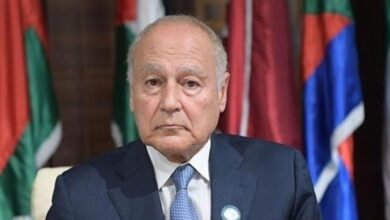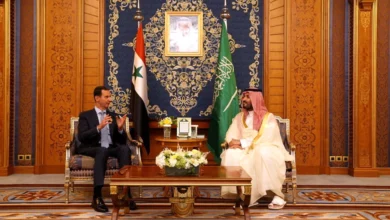Arab foreign ministers grudgingly backed a US proposal for indirect talks between Palestinians and Israelis on Wednesday in a bid to revive the stalled Middle East peace process.
"Arab foreign ministers decided to give suggested proximity talks a chance for four months," Palestinian negotiator Saeb Erekat told reporters at the Arab League’s Cairo headquarters.
In an opening speech to the assembled Arab FMs, Arab League Secretary-General Amr Moussa said that "despite the lack of conviction and seriousness on the Israeli side, Arab foreign ministers decided to give indirect talks a chance as a last attempt and to facilitate the US role."
Moussa warned that Arab endorsement of indirect peace talks would be conditional on the talks not becoming “an open-ended process,” saying they must be concluded within four months.
“Indirect talks should not automatically turn into direct Israeli-Palestinian negotiations without a total freeze in settlement construction,” Moussa explained. He also said that Arab foreign ministers planned to reconvene in early July in order to assess the talks’ results.
So-called proximity talks–proposed by the US with the stated aim of ending the impasse between Israelis and Palestinians over conditions for resuming direct negotiations–broke down more than one year ago, at the time of Israel’s massive military offensive in the Gaza Strip.
The US plan includes the understanding that resolution of the border issue should constitute the starting point for any future peace talks, in an attempt to sidestep controversy over the continued construction of Israeli settlements on occupied territory. Egypt has taken up a similar position.
Arab approval of the plan will provide Palestinian Authority (PA) President Mahmoud Abbas the political cover he needs to accept the offer. Abbas has repeatedly rejected direct talks in the absence of a complete halt to Israeli settlement building in the West Bank and East Jerusalem. Abbas had been wary of entering into even indirect talks without Arab backing.
Israeli Prime Minister Benjamin Netanyahu agreed to a ten-month moratorium on new settlement construction in the West Bank in November, but the measure did not include building that had already begun or construction in East Jerusalem, which Palestinians claim as the capital of a future state.
Arab endorsement of indirect peace talks, however, was not unanimous, with both Syria and Qatar expressing reservations.
Syrian Foreign Minister Walid al-Moallem interrupted Moussa while the latter was reading his statement, insisting that the decision on whether or not to join indirect talks was up to the Palestinians. "The Palestinians are in a better position to know what to do," he said.
Following the opening session, Syria’s envoy to the Arab League, Youssef al-Ahmad, told reporters that his country was not the only party to reject the US proposal. “We were not the only country that expressed reservations about engaging in indirect peace talks," he said. "Other Arab delegations did so as well.”
“It’s pointless to endorse the PA’s decision if it has already agreed to take part in indirect talks without receiving any tangible guarantees,” al-Ahmad added. “It’s not our business to bestow a kind of legitimacy on the Palestinians… It’s up to them to assume their historical responsibility,” he said.
One Arab diplomat that attended the meeting told Al-Masry Al-Youm that Qatar had also rejected the Palestinian offer to support indirect peace talks.
Moussa stressed that even indirect negotiations would be doomed to failure if Israeli measures–such as the continued construction of Jewish-only settlements on occupied Arab land–continued. He warned that if indirect talks failed to yield results, Arab states would call for an emergency meeting at the UN Security Council to address the Arab-Israeli conflict and urge Washington not to use its veto.
Abbas has been under enormous pressure from US-allied Arab states such as Egypt and Jordan to accept the American proposal for indirect talks, but the PA president has told Arab leaders that he would not take the step alone.
Israeli government spokesman Mark Regev welcomed the Arab decision.
"Prime Minister Netanyahu has been calling continuously for the resumption of peace talks and we hope now that the talks can move forward," he said.
“Abbas is very well aware that he cannot afford to resume peace talks without sufficient American guarantees and without Arab support,” Samir Ghattas, an Egyptian expert in Palestinian Affairs, told Al-Masry Al-Youm.
“With the Palestinian political theater highly fragile and divided, Abbas wanted Arab states to pressure Hamas and its Syrian patron not to go public and tarnish his image,” Ghattas explained.
On Wednesday, Palestinian Islamic Resistance Movement Hamas, which controls the Gaza Strip, slammed the Arab League’s approval for holding indirect talks.
"This decision could give cover to the [Israeli] occupation to go ahead with its projects to Judaize Jerusalem and the Islamic shrines," Hamas spokesperson Taher al-Nounou told reporters.
Nounou added that the planned talks "don’t represent the Palestinian people, so we reject them."
On a separate note, Arab foreign ministers also discussed a proposal to establish an Arab peacekeeping force to be deployed in Arab conflict zones.
Arab diplomatic sources told Al-Masry Al-Youm that the ministers were expected to discuss the mandate of the proposed peacekeeping force, its composition, training and funding sources.
They declined, however, to verify earlier media reports suggesting that the would-be peacekeeping force would be stationed in the Gaza Strip as part of an Egyptian-backed plan to end Palestinian infighting, a prospect that had been vehemently rejected by Hamas in 2008.
Last month, senior Arab military officials met in Cairo to discuss the notion of creating an Arab peacekeeping mission. Moussa, along with defense officials from Egypt, Saudi Arabia, Syria, Sudan, Iraq and Somalia, participated in the meeting.



